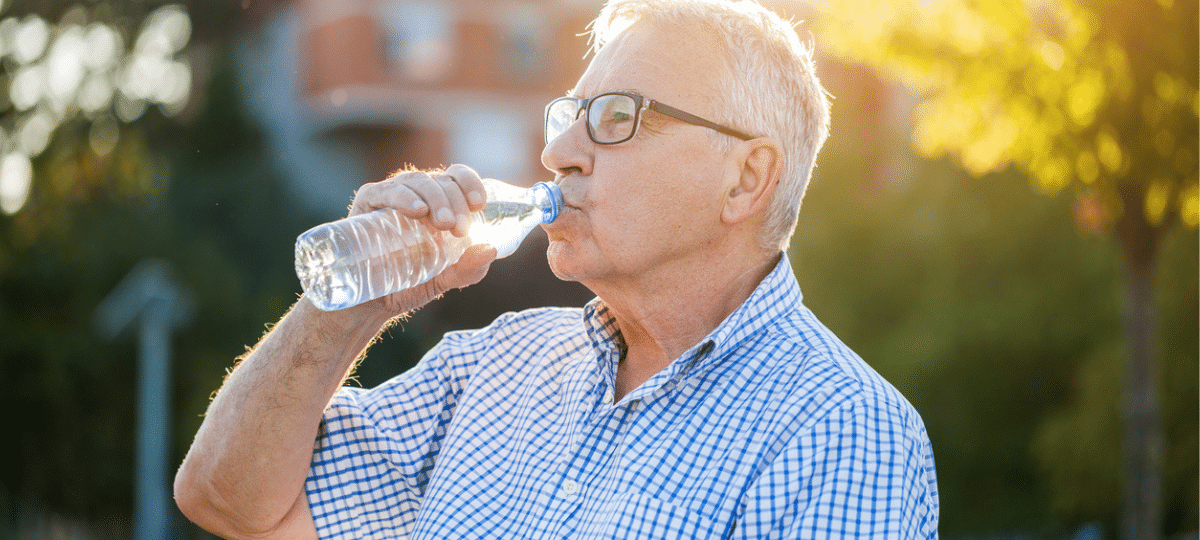We all could likely try a bit harder to drink enough water. It is what helps our bodies function, keeps everything moving and working as it should be. Many people don’t drink enough water.
For seniors, it may be a bit more difficult. Often, they may forget, or if they have bladder concerns, would prefer not to drink too much in fear of an accident.
As we age, we also may not realize we are thirsty. We tend to not eat as much and that can lead to dehydration, as many foods we eat contain a lot of fluid, in particular, fruit and vegetables.
Certain medications that people take can dehydrate them and that can also lead to dehydration. We can also become dehydrated if we can no longer regulate our body temperature.
Signs of Dehydration in Seniors
Some signs of dehydration may be more obvious than others. Here are a few signs to watch out for.
- Dry skin or cracked lips
- Dry mouth
- Sunken eyes
- Confusion
- Fatigue
- Inability to sweat or produce tears
- Dizziness
- Dark or lack of urine
- Mobility difficulty
- Rapid heart rate
- Low blood pressure
If you notice any of these signs, encourage them to drink some water and seek medical attention. It can be difficult to recognize signs of dehydration in people who are older and they may not recognize it themselves.
When they don’t feel the thirst, it can be very difficult to know if they are in need of water. As a caregiver, it will be vital to monitor their fluid intake and make sure they are getting enough.
Why Seniors Need Enough Water
We all know how we feel when we are dehydrated. Imagine it much worse for our seniors. If they don’t get enough water, and this goes on for several days, then they can start to decline rather rapidly.
Mental Functions
Brain fatigue can happen quite quickly in seniors. We can’t concentrate when we haven’t had enough fluids, and this is more difficult for seniors. If they are even slightly dehydrated, they can start to lose their train of thought.
They may start to become confused, have trouble concentrating, have problems having a conversation or communicating properly, and even become forgetful. If left too long, it can be irreversible.
Digestion
Proper hydration is what keeps everything moving and functioning throughout our digestive system. When we don’t have enough fluid, it’s much more difficult for our body to break down our food.
When our body can’t break down the food, we don’t get the nutrients we need. This can lead to constipation, heartburn, gas, and discomfort. It is important that our digestive system removes waste every day.
Kidney Function
Our kidneys act like a filter, and they need water to function. They remove waste and toxins from our blood that pass through our system with urine. It is imperative that they are allowed to do that.
If the body isn’t receiving enough water, then the kidneys can’t do their job. Toxins can build up and this is dangerous, in particular, for seniors. Toxins, salt, fluid, and electrolytes can build up in the body, causing renal failure.
Keeping Your Senior Hydrated
Keep water with them at all times. If they don’t care for water, add lemon, lime, or other flavorings to it to make it taste better.
Encourage them to drink more tea, herbal, if you like, smoothies, and fruit juices. Keep in mind the sugar and caffeine content of the drinks you are consuming.
Add more fresh fruit and raw vegetables in their diet. Find fruit and veggies they like and try to make them more appealing so you can give them every day.
Have fun. Make a mocktail with fruit or vegetable juice or try enhanced flavored water. Add a slice of lemon, watermelon, or something fancy so they feel like it’s an occasion.
If you are worried about your loved one and dehydration, consider getting them a medical alert system. This means that help can be just a moment away. With the push of a button, the help they need will be there quickly.

